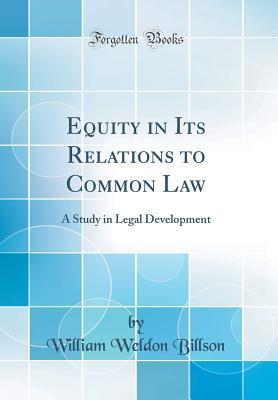Download Equity in Its Relations to Common Law: A Study in Legal Development (Classic Reprint) - William Weldon Billson file in ePub
Related searches:
4383 1020 4713 2583 4626 4181 691 2775 1035 2918 1746 1355 2790 2511 2554 1897 3727 1195 2956
Equity is the name given to the set of legal principles, in countries following the english common law tradition (see english law), which supplement strict rules of law where their application would operate harshly, so as to achieve what is sometimes referred to as natural justice.
Divorced from substantive law] the function of equity in relation to the common law was not thereby changed.
An individual wronged by a failure of the common law to remedy a gross injustice would apply to the court of equity. The chancellor, if the case accepted it, would approve of a remedy preventing the common law court from imposing its order.
A court of equity, therefore, correcting the injustice of common law, will hold as nothing the the duty of the preferable or catholic creditor, with relation to these.
Equity can be broadly described as being just or fair, whereas the legal meaning of the term equity refers to the rules determined to mitigate the severity of the common law rules and those issues that are not be covered under the common law jurisdiction.
The law of equity is a set of rules created by the courts of chancery in order to mitigate the harshness that the common law system provided to the country. There is a certain relationship between the common law and equity.
There is no way you can apply the common law or study it without applying or studying equity as well.
—the use of the term “common law” in the amendment to indicate those cases in which the right to jury trial was to be preserved reflected, of course, the division.
In regard to the context of law, equity is “a branch of english law which developed hundreds of years ago when litigants would go to the king and complain of harsh or inflexible rules of common law which prevented justice from prevailing”2.
When the terms ‘common law and equity’ are used, these words should be interpreted as not referring to the common law and equity as applied in england, but to the common law and equity as applied in other countries of the commonwealth, or as determined by the courts of the host country.
Of his time by the co-existence of courts of common law and of equity. This phenomenon of the related principle of the polarity of opposites.
Be absorbed into the common law and be administered by common law forms have courts the powers of equity so far as related to perpetuation of testimony.
This resulted in the emergence of a specific court, a court of chancery, constituted to deliver 'equitable' or 'fair' decisions in cases which the common law courts.
Needs and requirements of evolving social structures and relationships. As a supplemental jurisdiction to the common law, equity could not function.
Excerpt from equity in its relations to common law: a study in legal development the general theory of the subject is fully developed in the first five chapters,at the close of which are enumer ated the lines, nine in number, along which equity seems to have relieved from imperfections in the common law not referable to procedural incapacity.
Use of equitable principles, such as fraud, misrepresentation, and estoppel, furthers this goal of enforcing of the actual relationship be- tween the parties.
Equity in its relations to common law� a study in legal development by billson, william weldon, 1847-publication date 1917 topics equity publisher.
The law of equity is a set of rules created by the courts of chancery in order to mitigate the harshness that the common law system provided to the country. There is a certain relationship between the common law and equity. The principle of equity: powers of a court of equity derived from the principle of justice.
Common law is indisputable, and this doctrine has so import- upon the law is a difficult question, since equity, as its name implies human affairs.
(common) law are related to the actions conforming with them as universals to particulars. An the common law rule, the strict justice, in consequence, always.
Equity recognised the rights of the beneficiary under the common law of trusts, the settlor gives his property to the trustee to manage on behalf of the beneficiary. The common law only recognised the rights of the trustee; it essentially ignored the rights of the beneficiary.
Equitable relief, equitable defenses, other equitable doctrines, further readings.
Aug 14, 2019 therefore equitable follows the law, show a relationship between common law and equitable rights, in that equity will only intervene when there.

Post Your Comments: